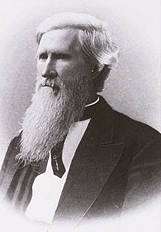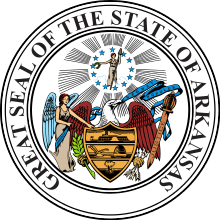Henry Massey Rector
| Henry Massie Rector | |
|---|---|
 | |
| 6th Governor of Arkansas | |
|
In office November 16, 1860 – November 4, 1862 | |
| Preceded by | Elias Conway |
| Succeeded by | Harris Flanagin |
| Member of the Arkansas House of Representatives | |
|
In office 1855–1859 | |
| Member of the Arkansas Senate | |
|
In office 1848–1850 | |
| Personal details | |
| Born |
May 1, 1816 Louisville, Kentucky |
| Died |
August 12, 1899 (aged 83) Little Rock, Arkansas |
| Resting place |
Mount Holly Cemetery Little Rock, Arkansas 34°44′16.5″N 92°16′38.6″W / 34.737917°N 92.277389°W |
| Political party | Democratic |
| Religion | Methodist |
Henry Massie Rector (May 1, 1816 – August 12, 1899) was an American politician and a member of the Democratic Party, who served as the 6th Governor of Arkansas from 1860 to 1862.
Biography
Rector was born in Louisville, Kentucky. Both his parents were of English descent.[1] He was educated by his mother and attended two years of school in Louisville. He moved to Arkansas in 1835, where he was later appointed U.S. Marshal.
Career
Rector was elected to the Arkansas Senate and served in that body from 1848 to 1850. He studied law and was admitted to the bar in 1854. From 1853 to 1857, he served as U.S. Surveyor-General of Arkansas for several years.[2] From 1855 to 1859, he served in the Arkansas House of Representatives. and spent one term as a justice of the Arkansas Supreme Court.[3]
Rector was elected Governor of Arkansas in 1860. During his term Arkansas seceded from the U.S. and was admitted into the Confederate States. The constitution of Arkansas was rewritten reducing the term of office for Governor to two years. At the Arkansas secession convention in March 1861, Rector addressed the convention in an oratory urging the extension of slavery:
The area of slavery must be extended correlative with its antagonism, or it will be put speedily in the 'course of ultimate extinction.'... The extension of slavery is the vital point of the whole controversy between the North and the South... Amendments to the federal constitution are urged by some as a panacea for all the ills that beset us. That instrument is amply sufficient as it now stands, for the protection of Southern rights, if it was only enforced. The South wants practical evidence of good faith from the North, not mere paper agreements and compromises. They believe slavery a sin, we do not, and there lies the trouble.— Henry Massey Rector, Arkansas Secession Convention, (March 2, 1861).[4]
Rector left office in 1862 and served as a private in the state militia for the rest of the war. He participated in the 1874 constitutional convention.
Family life
Rector was the first cousin of Representative Henry Conway, Governor James Conway and Governor Elias Conway. Rector was also a third cousin of General James Kemper. He was a first cousin of fellow Confederate general Alexander Steen.
His son, Elias, ran for Governor of Arkansas twice and served in the Arkansas House of Representatives for several terms, served as Speaker of the House, and married the daughter of Senator James Alcorn of Mississippi. His grandson, James, was the first Arkansan to participate in the Olympic Games.
Death and legacy
Rector died in Little Rock and is buried in Mount Holly Cemetery there.[5] Rector Street in Little Rock is named after him. The north-bound frontage road along Interstate 30 bears his name. The northeast Arkansas town of Rector is also named for Rector.
See also
References
- ↑ Biographical and pictorial history of Arkansas, Volume 1 By John Hallum page 405
- ↑ "Henry Massie Rector (1816–1899)". The Encyclopedia of Arkansas History & Culture. Retrieved August 10, 2012.
- ↑ "Arkansas Governor Henry Massey Rector". National Governors Association. Retrieved August 10, 2012.
- ↑ Arkansas Secession Convention. 1861. p. 4.
- ↑ "Henry Massie Rector". Find A Grave. Retrieved August 10, 2012.
External links
- Henry Massey Rector at Find a Grave
- Henry Rector at the Encyclopedia of Arkansas History & Culture
- Henry Rector at the National Governors Association
- Henry Massey Rector Family
- Memorial Foundation of the Germanna Colonies in Virginia, Inc.
- Rector-Conway-Sevier-Johnson Family
| Political offices | ||
|---|---|---|
| Preceded by Elias Conway |
Governor of Arkansas 1860–1862 |
Succeeded by Harris Flanagin |
